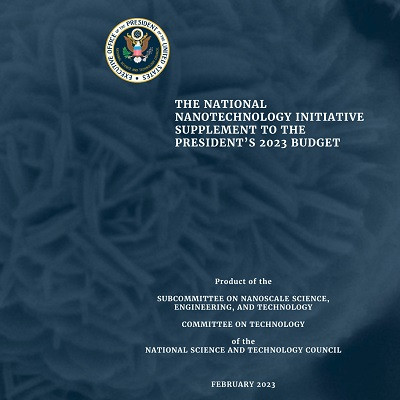
2023-03-30
Visited : 827
The National Nanotechnology Initiative (NNI) announced that it published a supplement to President Biden’s 2023 budget request. The National Nanotechnology Initiative (NNI) is a U.S. Government initiative that involves 20 federal departments, agencies, and commissions working together to promote the understanding and control of matter at the nanoscale. This initiative supports a shared infrastructure, establishes shared goals, and enhances interagency coordination of nanotechnology research and development.
Nanotechnology has broad applications in various fields and can help address global challenges. The NNI engages with academia and the private sector to promote technology transfer and facilitate commercialization. The NNI also aims to build the nanotechnology workforce of the future and engages with international regulatory and research agencies and nanotechnology associations worldwide.
The 2023 budget for the NNI has been set at $1.99 billion, with a focus on research in nanoscience, applications, devices, and systems, as well as responsible development. The NNI agencies will collaborate to create an integrated R&D program, invest in research infrastructure, and support STEM (science, technology, engineering, and mathematics) education. Additionally, funding has been allocated to address the COVID-19 pandemic, including research to detect, treat, and prevent the disease.
The NNI Program Component Areas (PCAs) align with the goals in the 2021 NNI Strategic Plan and cover a wide range of nanotechnology R&D activities across scientific disciplines, application areas, and technology maturity levels. The five PCAs are:
– Foundational Research
– Nanotechnology-Enabled Applications, Devices, and Systems
– Research Infrastructure and Instrumentation
– Education and Workforce Development
– Responsible Development
The NNI places great importance on foundational research, which makes up 45% of the proposed budget for 2023. The National Institutes of Health (NIH) and the National Science Foundation (NSF) are the largest contributors, followed by the Department of Energy (DOE) and the Department of Defense (DOD). With a focus on individual and small group research grants and centers programs, NSF invests in various aspects of nanoscale science and engineering. In addition, NSF is expanding its efforts in nanobiotechnology related to synthetic biology and synthetic cells, including understanding the nanoscale machines that make up a cell's nucleus.
The US government invests in nanotechnology research for various purposes, including biomedical innovations, infrastructure materials, electronics, manufacturing, sensors, agriculture, and space exploration. The National Science Foundation, Department of Defense, Army/ERDC (Engineer Research and Development Center (Army)), and DARPA (Defense Advanced Research Projects Agency) are among the agencies investing in nanotechnology-enabled applications, devices, and systems. Meanwhile, other agencies such as the National Institute of Allergy and Infectious Diseases, National Institute of Dental and Craniofacial Research, and NASA (National Aeronautics and Space Administration) are investing in nanotechnology research for specific applications such as nanoparticle-based vaccines, dental materials, and carbon nanotube-based composites. The DOE invests in nanotechnology-enabled research to support energy efficiency and renewable energy initiatives, while NIFA (National Institute of Food and Agriculture) invests in nanotechnology-enabled sensors for food and agriculture. NIST (National Institute of Standards and Technology) is developing standards and calibrations for super-resolution optical microscopy and nanofluidic measurement devices.
The National Nanotechnology Initiative (NNI) relies on research infrastructure, including physical facilities and cyber resources, to support its ecosystem. Agencies use a wide variety of mechanisms to support the research infrastructure, including center grants and instrumentation development or acquisition programs. The DOE Office of Basic Energy Sciences operates five Nanoscale Science Research Centers (NSRCs) and offers state-of-the-art microscopy and other capabilities to researchers. The NIH/NCI (National Cancer Institute) continues to support the Nanotechnology Characterization Laboratory (NCL) for cancer research and personalized vaccine strategies. NIST provides researchers with access to world-class facilities and research instrumentation and is developing new techniques to measure and study biomolecules and nanoscale structures. The National Science Foundation (NSF) provides support for the National Nanotechnology Coordinated Infrastructure (NNCl), including a national coordination office.
The NNI relies on a skilled workforce for nanotechnology innovation, and education and workforce development programs are in place to support this. These programs include fellowships, traineeships, internships, and centers. Examples of targeted programs include Supporting Micro and Nano Technicians through Hybrid Teaching Methods and Nano-Makerspace to Make and Explore in the World of the Small. Funding for education and workforce development activities in all areas of nanoscale science and engineering will be provided by NSF in 2023. The AFRI (Agriculture and Food Research Initiative) Education and Workforce Development program focuses on enhancing the workforce in the food and agricultural sciences. NASA regularly supports undergraduate and graduate-level scientists, engineers, and faculty working on nanotechnology.
The responsible development of nanotechnology is also a priority for the US government, with initiatives taken by different agencies to address potential implications of technology applications and to protect researchers, workers, consumers, and the environment. The responsible development framework articulated in the 2021 NNI Strategic Plan has expanded to include ethical, legal, and societal implications, issues of research integrity and security, and inclusion, diversity, equity, and access. Different agencies such as NSF, FDA (Food and Drug Administration), NIOSH (National Institute for Occupational Safety and Health), and NIEHS (National Institute of Environmental Health Sciences) are investing in nanotechnology research to understand nano-bio phenomena, reduce the risks of nanotechnology development, and promote public health.
The proposed 2023 investments for the National Nanotechnology Initiative (NNI) are aligned with efforts to renew US leadership in the semiconductor and microelectronics industries under the CHIPS and Science Act of 2022. Foundational nanotechnology research and nanoelectronic devices and systems will provide important advancements in microelectronics. The NNI participating agencies will provide a strong foundation for the additional microelectronics infrastructure to be developed with CHIPS Act funding. Moreover, the NSF will enhance its existing education programs to grow the semiconductor workforce and education activities.